
Axiom X3®, an implant for tissue preservation

Dr. Andreas BENECKE
Dental Surgeon
Germany
- Dentist specialized in implantology and prosthodontics (DGPro)
- Doctorate in dentistry with the predicate « magna cum laude », 2009
- Postgraduate course, University of Greifswald, « Master of Science in Dental Prosthetics », 2010 & 2013
- Private practice in Elmshorn, since 2014
Case introduction
The Axiom X3® implant is a real gamechanger in my office. It preserves more bone and the implant can be used for many clinical indications. In this case a GBR/GTR procedure was performed (Socket Preservation) after extraction. Therefore, the bone situation can be challenging and is usually not a D1 bone situation. The under-drilling protocols and the option to have an implant for all clinical situations are a real benefit in this case. Due to a high primary stability, we were able to apply an open healing procedure which I personally recommend due to a one-stage surgery procedure.
Initial situation
1. Drill guide with 4.2 sleeve based on CBCT (X-ray data) and intra-oral Scan (STL Data) using 3Shape. Merging this data with coDiagnostix to obtain a full-digital-surgical guided using INTEGRAL Guided Surgery 5.0 (sleeve 5.0).
Surgery
10. Drill L12 yellow for final length, diameter 3.6 for under drilling protocols in a D2 bone situation.
11. Axiom X3® implant 4.6 12mm.
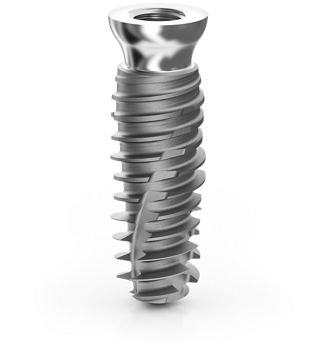
Curious about Axiom X3® profile?
Axiom X3® dental implant is a unique design for controlled insertion and optimal stability in a wide range of indications, with maximum bone preservation regardless of density.
12. Occlusal view: guide in place with final drilling to show the perfect placement with guided surgery.
13. Lateral view: clinical situation after implant placement.
14. Final suturing (suture thread 6-0) with a de-epithelialized flap to thicken the buccal soft tissue; around a standard healing abutment for transgingival open healing.
Prosthetic restoration
15. Final restoration seated on printed model.
16. Final restoration in comparison of the natural tooth (nature vs. biomimetic implantology).
17. Final restoration with original Axiom X3® and screwdriver.
18. Lateral view after delivering the final screw-retained restoration, a monolithic zirconia crown on a Ti-base (Flexibase® with 5mm diameter, GH 2.5mm and CH 3.5mm).
19. 20. 21. Occlusal views.
22. Final situation with a monolithic screw-retained restauration.
Conclusion
In this case, there was no second surgery needed and the final prosthetics (monolithic restoration on standard Flexibase®, screw-retained) could be delivered right after the healing time. Less invasiveness, less surgery time, less pain, a faster recovery and especially saving hard bone and soft tissue is a real advancement in my daily surgery routine. The Axiom X3® really helps me to deliver better and faster results for my patients and allows me to widen my surgical and prosthetic repertoire for all my patient needs. It is precise, fast and super predictable with less discomfort for the patient. It is the new gold standard in implantology.



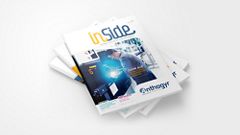
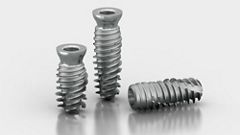

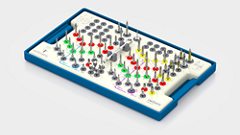



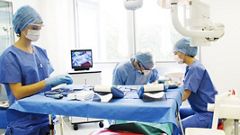

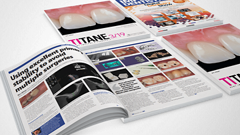
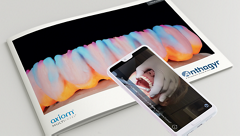

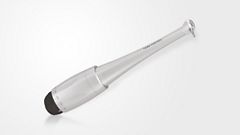
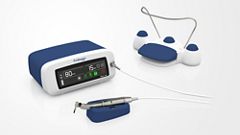
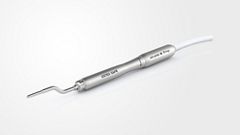

%20guide.jpg?crop=0,0,4612,2594&wid=950)
%20initial%20situation.jpg?crop=393,0,2360,1770&wid=320)
%20guide.jpg?crop=476,0,2857,2143&wid=320)
.JPG?crop=374,0,5973,4480&wid=320)
.JPG?crop=374,0,5973,4480&wid=320)
.JPG?crop=374,0,5973,4480&wid=320)
.JPG?crop=374,0,5973,4480&wid=320)
.JPG?crop=0,350,6720,3780&wid=950)
.JPG?crop=0,2100,4480,2520&wid=950)
%20guide%20after%20drilling.jpg?crop=0,0,3428,1928&wid=950)
.JPG?crop=0,350,6720,3780&wid=950)
%20healing%20screw%20and%20sutures.jpg?crop=0,0,3114,1752&wid=950)
%20lab%20rehabilitation.jpg?crop=0,0,3765,2118&wid=950)
%20final%20restauration%202.jpg?crop=0,0,4988,2806&wid=950)
%20final%20restoration.jpg?crop=0,0,6312,3551&wid=950)
.JPG?wid=950)
%20final.jpg?crop=0,0,2590,1457&wid=950)